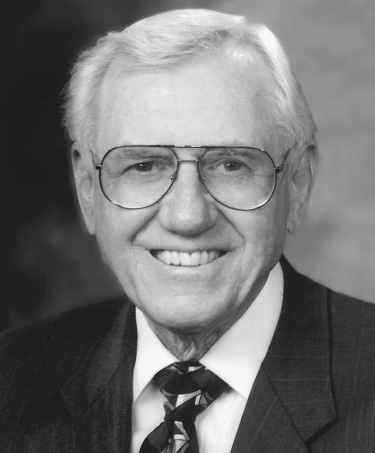Harry S. Rinker*
Class of 2003
- Owner Rinker Company

If you pursue opportunities that come your way, make the most of your attributes, and work hard, then you will be successful.
Harry Rinker was born in 1921 in Toronto, Canada, to American citizens. When he was age two, his parents moved to Washington state. Rinker's father made very little money working at odd jobs, and the family lived in a small rented house without electricity or plumbing. "We thought that was normal," said Rinker. "We didn't even know anyone who had indoor plumbing." When he was six, they moved to a two-bedroom rental house in Tacoma that cost $10 a month. Rinker recalled that while they had very little, his father was proud that he could pay his rent when so many at that time could not.
The Rinkers lived a quiet, austere life. His mother washed their clothes in a tub with a scrub board. "We took baths once a week in a tub that was heated with water warmed on our wood stove," he says. "My mother also canned enough fruits and vegetables each summer to last us through the winter. In those days, you had to work hard just to survive. But I didn't realize we were poor. Everyone we knew was in the same boat."
Rinker's parents stressed the importance of integrity and hard work. "Those things came naturally to me," he said. "I never minded working." Although he had helped his parents with household chores from the time he could walk, Rinker's first paying job came when he was 10. A man came to his school to recruit several boys to sell used magazines. "He picked us up and drove us to different neighborhoods in town," he said. "We were paid 10 cents an hour. I sold magazines until seven o'clock, then went home and had a late dinner." Rinker gave his daily earnings of 35 cents to his mother for safekeeping. At the end of the year, he had accumulated enough to buy a bicycle.
In the winter, Rinker chopped wood for neighbors; in the summer, he cut lawns. From the time he was 12, he paid for all his personal expenses. When Rinker turned 15, he got a full-time summer job at a fruit and vegetable cannery, putting in 60 to 70 hours a week at 45 cents an hour. At the end of that first summer, he bought a 10-year-old touring car for $25. He stayed on at the cannery when school resumed, working 30 to 40 hours a week on the night shift. He quit only when he began falling asleep during classes.
After graduation from high school, Rinker went to work in the shipyards. To bolster his income, he got a real estate license. Amazed that he could make a $100 commission for selling one house at $2,500, Rinker worked hard for what he says was easy money. Soon, he was one of the company's top salesmen, and the only one with a separate day job.
Rinker signed up for the U.S. Army Air Corps the day after Pearl Harbor was bombed in 1941 and served as an enlisted man for four years. When the war ended, he returned to work in real estate. In 1947, he formed a partnership with a developer, and together they built tract homes in Tacoma until the economy went flat in 1953. They then moved their operation to California, where they built several thousand homes in Anaheim and Garden Grove over the next seven years. Rinker ended his partnership and began building service stations, and then shopping centers, throughout the western United States. In 1973, he sold his company to another firm; managed the newly merged entity for five years; and formed Rinker Company, a real estate investment and development firm that operates in Idaho and southern California.
"Real estate is a wonderful opportunity," said Rinker. "I discovered in my career that if you put your mind to something and work hard, you will be successful. His advice to youth was to seize all opportunities that present themselves. "Pursue opportunities with an all-out effort," he said. "Even if you have adversities or handicaps, which we all do because no one is perfect, make the most of your attributes and work hard. If you do that, you will be successful."
Honesty and generosity are traits Rinker especially admired and incorporated into his daily life. "There is only so much you can have in worldly goods," he said. "The real joy of life is in helping others."
